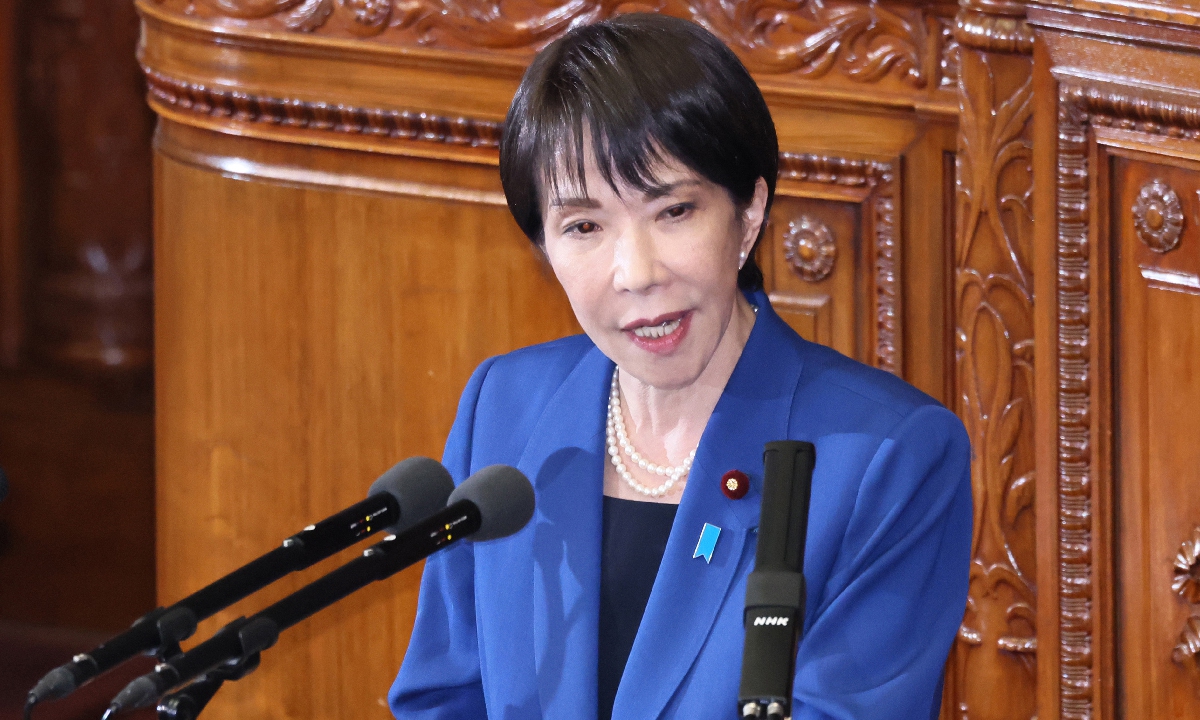On Friday, Japanese Prime Minister Sanae Takaichi delivered her first policy address, which contained remarks on China that aligned closely with information disclosed by Japanese media the previous day.
According to the full text of Takaichi’s address released by Nikkei Shimbun, Takaichi stated that China is an important neighbor for Japan, and it is necessary to build a constructive and stable relationship with China.
“Through candid and repeated dialogues between the Japanese and Chinese leaders, we will comprehensively promote a mutually beneficial relationship based on common strategic interests,” Takaichi remarked.
However, at the same time, she claimed that the military activities and other developments by China, North Korea, and Russia are “serious causes for concern.” She also claimed there are “security concerns” exist between China and Japan, including in the area of economic security.
Experts on China-Japan relations observe markedly moderated tone on China this time – compared to her earlier hardline rhetoric against China – a shift they believe is a common pattern among Japanese politicians, where leaders often adopt a more measured and pragmatic approach to China after assuming office.
“Takachi’s statements regarding China have toned down her hawkish colors, attempting to project a sense of balance, which essentially continues the policy tone of recent Japanese cabinets,” Xiang Haoyu, a distinguished research fellow at the Department for Asia-Pacific Studies of the China Institute of International Studies, told the Global Times on Friday.
“Considering Takaichi administration has just been born, its future direction remains unclear. Therefore, she needed a relatively steady positioning,” Da Zhigang, director of the Institute of Northeast Asian Studies at the Heilongjiang Provincial Academy of Social Sciences, told the Global Times on Friday.
Da views this speech concerning China as a “conventional statement aimed at stabilizing bilateral relations.”
Citing Takaichi’s remarks claiming China as the one of “serious concerns,” Da pointed out that the wording shows some adjustment compared to the “threat” rhetoric she used during her campaign.
“It’s apparent she is still quite wary of China’s reaction and might be worried about facing diplomatic passivity right from the start,” Da said.
“However, the signals she sends do not mean she has changed her positioning of viewing China. I see it more as expediency,” Da said, citing the facts that Takachi is a conservative politician leaning to the right and her election victory also relied on support from conservative factions within her party.
Xiang shared similar views, pointing out that Takaichi’s remarks still reflect the dual nature of Japan’s China policy. In light of Takaichi’s proposal for “candid dialogues” alongside expression of “concerns,” the expert warned that Tokyo should not be a case of saying one thing while doing another.
During her speech, Takaichi also highlighted the so-called necessity for Japan to “proactively proceed with a fundamental strengthening of its defense capabilities,” vowing to implement measures to facilitate increasing the defense spending to the target of approximately 2 percent of GDP within 2025 fiscal year. Tokyo had previously planned to achieve this target in the 2027 fiscal year, Nikkei Shimbun reported on Thursday.
Takaichi noted that Tokyo will also strive to strengthen the defense industrial and technological base, which constitutes defense capability, according to the full text of her speech disclosed by Nikkei Shimbun.
Regarding constitutional amendment, Takaichi claimed that she aims to achieve the initiation of a proposal of the amendment by the Diet during her tenure as the Japanese prime minister.
Following the deceased former Japanese prime minister Shinzo Abe, the Takachi cabinet’s acceleration of military strengthening reflects its consistently conservative and hawkish political philosophy, Xiang commented.
Also, a push for the constitutional revision would be perceived as reflecting a mistaken attitude toward historical issues and a challenge to the post-WWII international order, severely damaging trust between Japan and its neighboring countries, Xiang warned.
In response to China-related remarks in Takaichi’s policy speech, Guo Jiakun, a spokesperson for the Chinese Foreign Ministry, on Friday stressed once again that with respect to peace and security, China has the best track record. In recent years, however, Japan has been drastically readjusting its security policy, increasing defense spending year after year, relaxing restrictions on arms export and seeking military breakthroughs.
“Japan’s neighboring countries in Asia and beyond have to strongly call into question its commitment to the exclusively defense-oriented policy and the path to peaceful development,” said Guo.
Looking through the new Japanese prime minister’s first policy address, regarding the future trajectory of China-Japan relations, key questions remain: Will she continue the policy approach of predecessor Shigeru Ishiba, who adopted a relatively moderate stance toward China after assuming office? Can she translate such continuity into concrete actions? These still require cautious observation, Chinese experts noted.




